ICT Corners do more than help refugees connect to families

Photos: Ute Hennig, Collaboration and Communications Advisor, IO
SOS Children's Villages is active in seven reception centres in Serbia, offering access to computers and communication in five ICT Corners, improvised school for children grades one to four, English, German and Serbian classes, art therapy, psychosocial support, couple and family counselling, consultancy for unaccompanied minors, handing out hygiene products and many more.
In Macedonia, SOS Children’s Villages offers ICT Corners and child friendly spaces in the Gevgelija and Tabanovce refugee reception centres. Currently, these two transit centres are almost empty, hosting only about ten to twenty refugees each. It is unpredictable if and when this changes.
Svetlana Radosavljević, Regional Refugee Advisor EUCB
"The refugees are interested in education, especially digital education. All our ICT corners are working at full capacity. Some of them have also been turned into mobile classrooms. So when they [the refugees] move, for example, to Hungary, they can continue with the course. They can start any course anywhere in one of our ICT Corners and finalize it in the next along their route. They then have a certificate they can use. They will need IT skills and languages no matter where they go.”
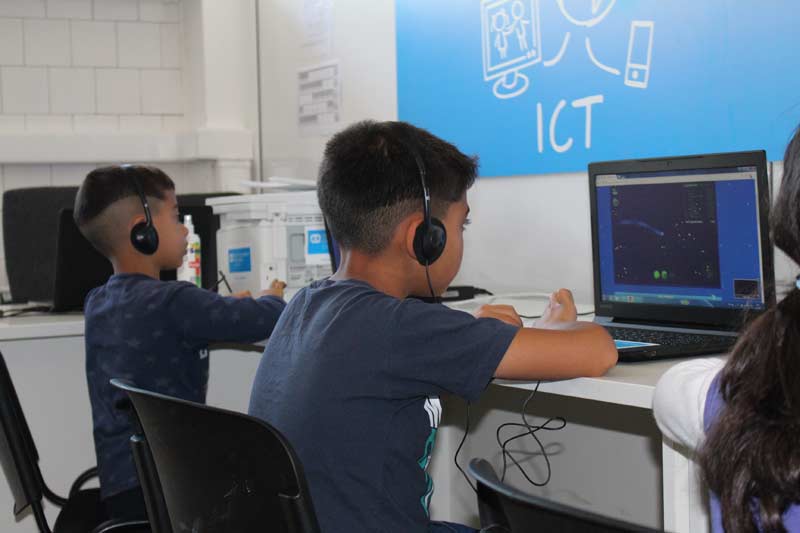
Two boys using the ICT Corner in Bujanovac.
Ahsan from Pakistan is staying in the reception centre in Preševo and greatly appreciates the ICT corners. “I was very happy when Milica [an SOS co-worker] showed me the SOS Children’s Villages ICT Corner – the place with Internet in the camp where I can talk with my family. That was a moment of special happiness because I was so worried about my family.”
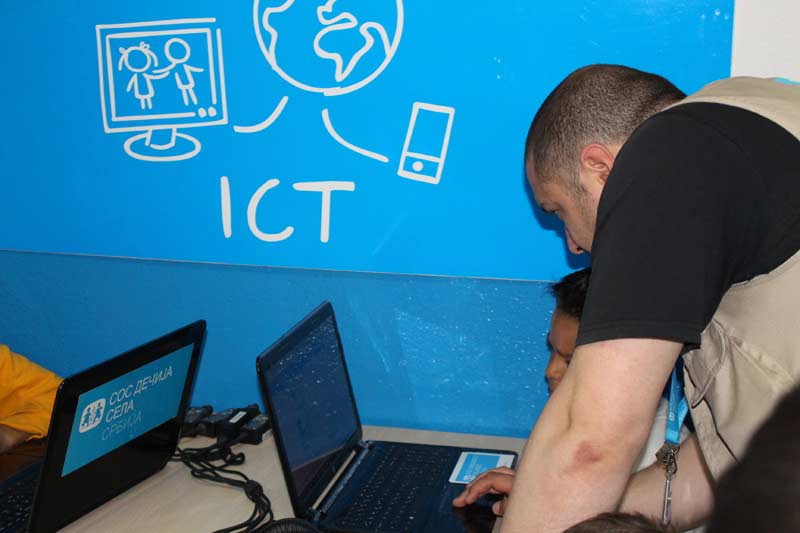
Aleksandar Guševski shows a visitor to the ICT Corner how to play a game.
Marko Andrejević, Educator in the refugee reception centre Bujanovac, Serbia
Although the refugee children speak different languages depending on their background, Marko Andrejević has no problems communicating with them. The children pick up new languages and technology quickly, but "educating women is the biggest problem", Marko says. "Many women can't read or write; literacy is an issue. Syria is more advanced; Afghanistan is the biggest challenge in culture and behaviour."
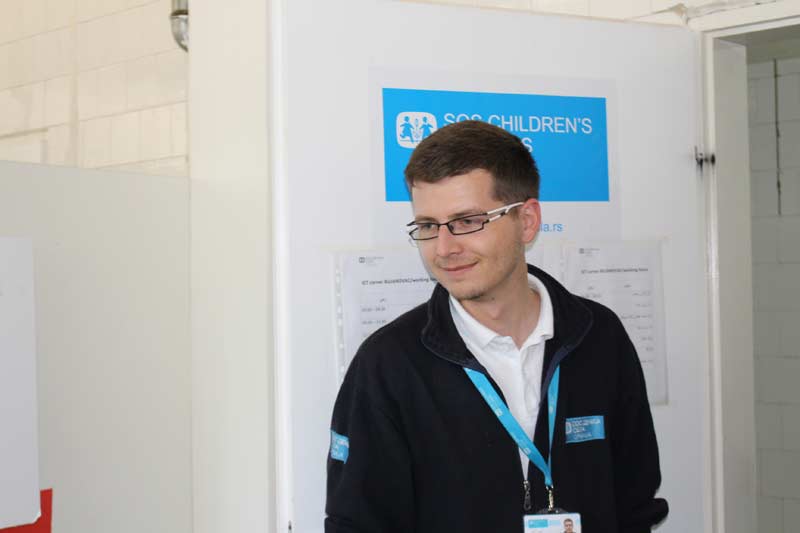
Marko Andrejević in the ICT Corner in the reception centre in Bujanovac.
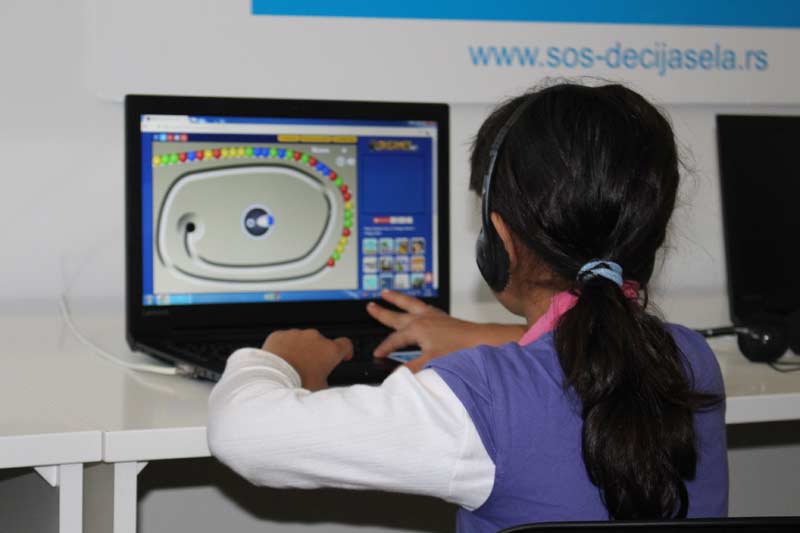
A little girl in the ICT Corner in Bujanovac. The ICT Corner has opening hours for different target groups: children, Youth, men, women.
Jelena Vićentijević, Educator in the refugee reception centre in Preševo, Serbia
The SOS team at the refugee reception centre in Preševo, Serbia, offers a variety of activities for the residents. Jelena Vićentijević, who works as an Educator, talks about what SOS Children’s Villages does for children and families in need:
Educational activities
"We offer informal school for grades one to four. We do not have a curriculum like in school, but we use units from real school books. Our subjects are the arts, music, and the world around us. Our school is based on the principle of learning through play. We try to be interesting for the children. They are very honest: If you are not, they leave."
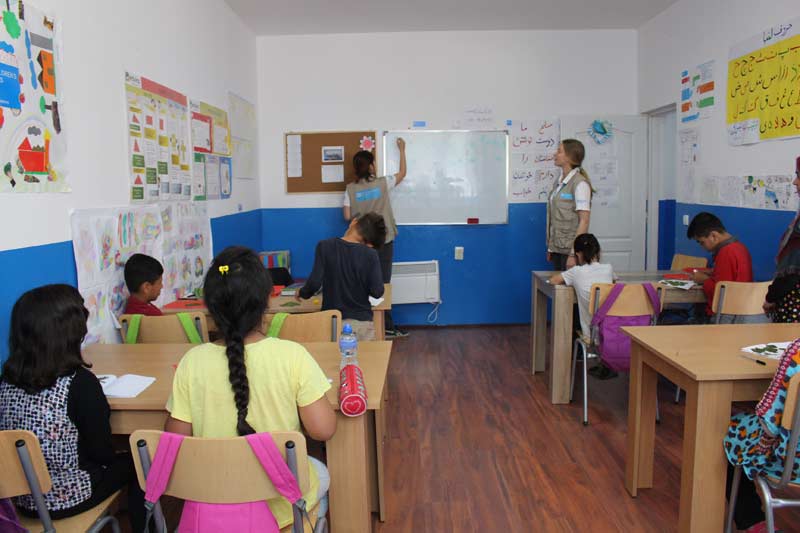
SOS Children’s Villages Serbia set up an improvised school at the reception centre in Preševo. Educator Jelena Zdravković writes today’s topic on the whiteboard: Herbarium.
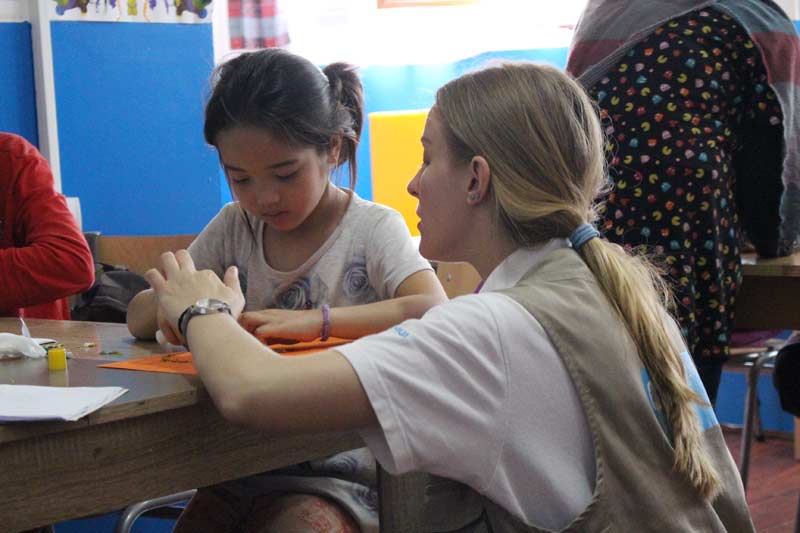
Educator Jelena Vićentijević is helping a little girl in class finish her project.
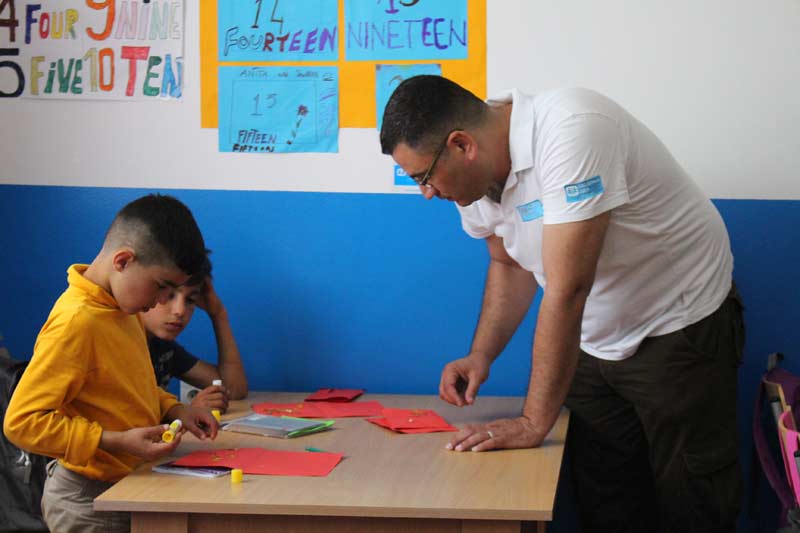
Cultural mediator Mahmoud ElShair helps children in school to accomplish their tasks.
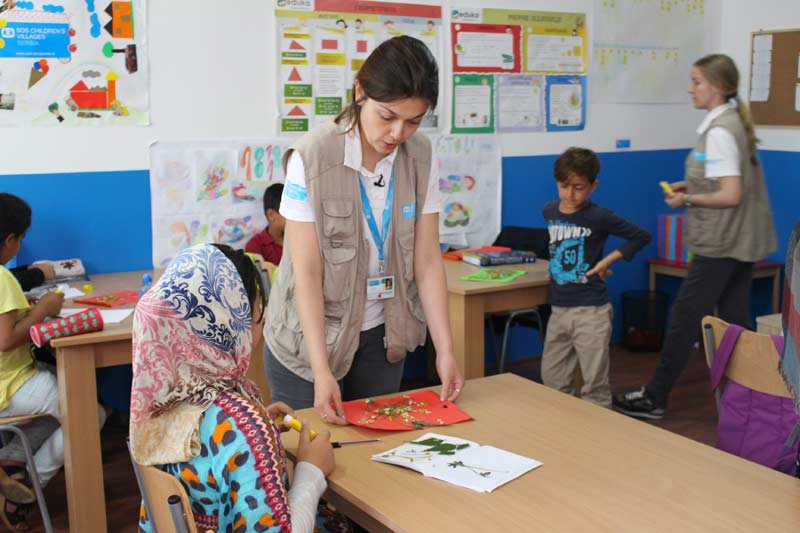
The topic of the unit today is “Herbarium”. Children are creating a page with dried flowers. Educator Jelena Zdravković talks to a girl from Afghanistan how to prepare a nice picture that she can give to her mother as a present.
Psychological workshops
"We work on the prevention of domestic violence and offer one workshop per week. After the feedback from participants, we switched to male instructors as this is more credible. We show men leading by example.
In the beginning, we were worried about how they would react. Some of them got scared and were resentful, others showed fear and thought, "Maybe I am this man?!" Afterwards, we have discussions: Is there hope for this family? For minor change or even major?
We are not pointing fingers at anyone, but people are recognizing themselves. They realize that they have to adapt to the new culture. But it's a process. It takes time. You have to go with their dynamics, and dynamics always change.”
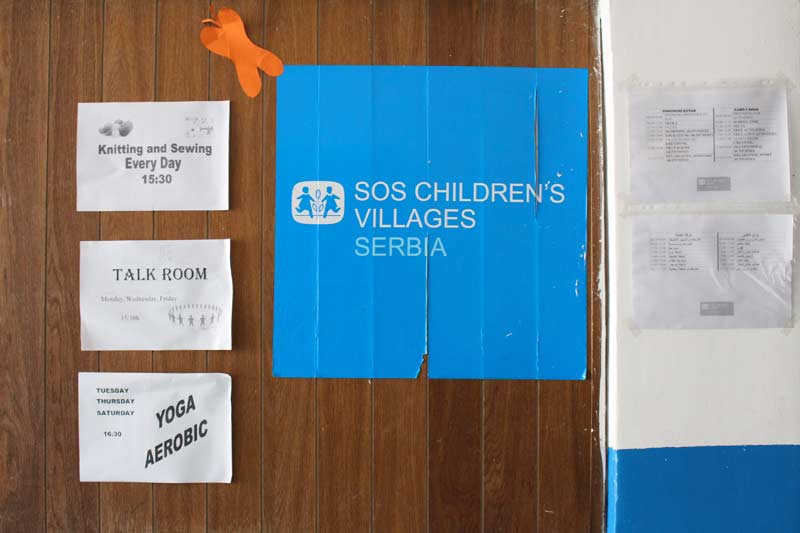
The daily schedule of activities offered by SOS Children’s Villages in Preševo.
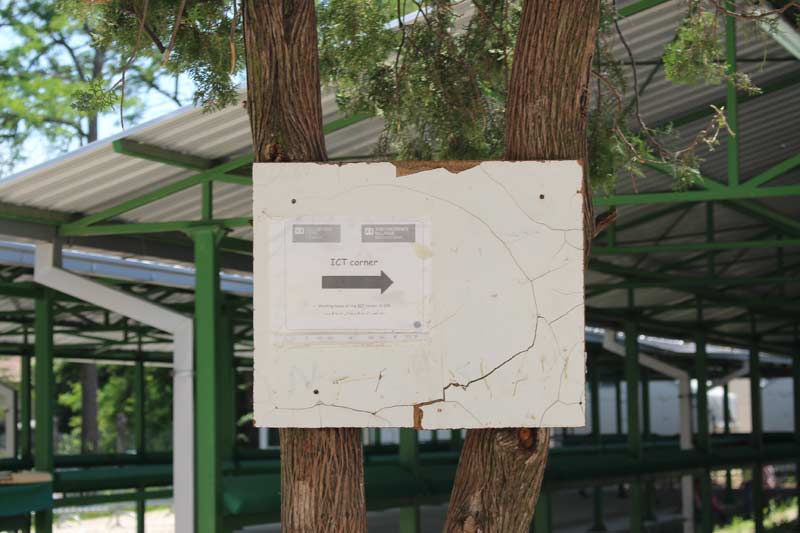
Participants are informed about the activities via posters in the reception centre and the bedroom leaders.
Workshops for women
We offer support groups for women and men. However, we notice that women are the most willing to change, communicate, and share.
In the beginning, the participants were scared and shy. They didn't know how to define their fears and emotions, didn't know what brave or curious meant emotionally. Women don't ask much; they are not used to that. But they are willing to open up. When we hit the right spot, they share a lot. ‘I don't want to be beaten, I don't want to have 10 children, I don't want to go where my husband goes.’ We can't promise anything, but we can empower them. They have a place to show their feelings.”
Workshops for couples, family therapy
“We also organize workshops for couples and offer family therapy. Our mentor and psychotherapist comes every week. He advises SOS co-workers on intervention and supervision and works with refugees on topics such as confidence and feelings.
Couples come when they have a specific problem concerning their family and children. Once they have come for the first time, they keep coming.”
Unaccompanied minors
“We also offer activities for unaccompanied minors who often come with smugglers and pretend someone to be their uncle. When they reach the camp, they are informed about what they get from which organization. But we also approach them directly and ask them to come. SOS Children's Villages organizes workshops and activities. They need actions. They need to do something and see the results right away. For example, they worked in the garden and saw the result when they were done.
The Number 1 problem of all refugees, though, is: ‘How do I get north? How can you help me? How can I cross the border?”
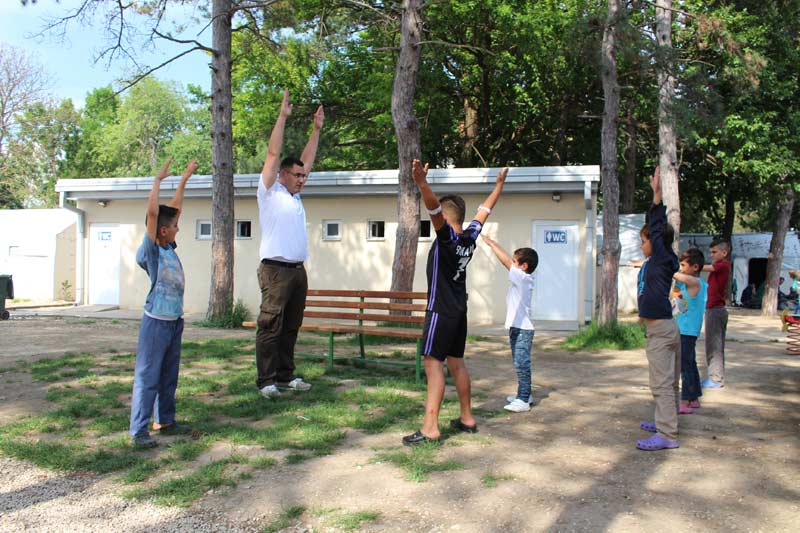
The kids need to be active. Cultural mediator Mahmoud ElShair keeps the boys busy with some exercises on the reception centre ground.
Challenges
“Our main challenge is the different languages. Currently, there are refugees from Pakistan, Afghanistan, Iraq, Syria, Morocco, Algeria and as far as Cuba in the reception centre. We do have interpreters, but we also rely on volunteers among the refugees.
Another challenge is the different views on life. What is normal in one's culture is not normal in another, such as the freedom of women or the right to express one's opinion. It's mainly women's and children's rights.
Our co-workers have to be very flexible. The circumstances and the dynamics in the reception centre change every day.”
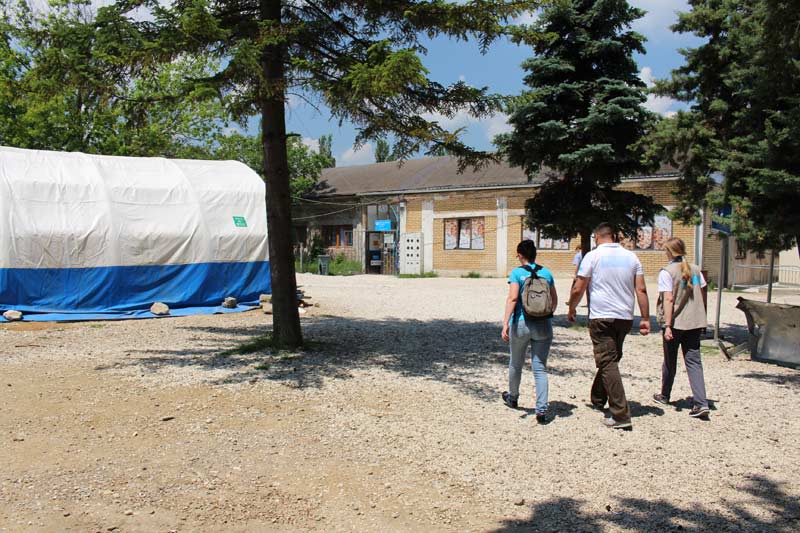
SOS co-workers are on their way to the building in the reception centre that hosts the SOS ICT Corner, the classroom and other pedagogical rooms.
